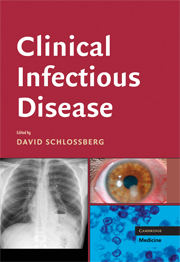Book contents
- Frontmatter
- Contents
- Preface
- Contributors
- Part I Clinical Syndromes – General
- Part II Clinical Syndromes – Head and Neck
- Part III Clinical Syndromes – Eye
- Part IV Clinical Syndromes – Skin and Lymph Nodes
- Part V Clinical Syndromes – Respiratory Tract
- Part VI Clinical Syndromes – Heart and Blood Vessels
- Part VII Clinical Syndromes – Gastrointestinal Tract, Liver, and Abdomen
- Part VIII Clinical Syndromes – Genitourinary Tract
- Part IX Clinical Syndromes – Musculoskeletal System
- Part X Clinical Syndromes – Neurologic System
- Part XI The Susceptible Host
- 83 Evaluation of Suspected Immunodeficiency
- 84 Infections in the Neutropenic Patient
- 85 Infections in Patients with Neoplastic Disease
- 86 Corticosteroids, Cytotoxic Agents, and Infection
- 87 Infections in Transplant Patients
- 88 Diabetes and Infection
- 89 Infectious Complications in the Injection Drug User
- 90 Infections in the Alcoholic
- 91 Infections in the Elderly
- 92 Neonatal Infection
- 93 Pregnancy and the Puerperium: Infectious Risks
- 94 Dialysis-Related Infection
- 95 Overwhelming Postsplenectomy Infection
- Part XII HIV
- Part XIII Nosocomial Infection
- Part XIV Infections Related to Surgery and Trauma
- Part XV Prevention of Infection
- Part XVI Travel and Recreation
- Part XVII Bioterrorism
- Part XVIII Specific Organisms – Bacteria
- Part XIX Specific Organisms – Spirochetes
- Part XX Specific Organisms – Mycoplasma and Chlamydia
- Part XXI Specific Organisms – Rickettsia, Ehrlichia, and Anaplasma
- Part XXII Specific Organisms – Fungi
- Part XXIII Specific Organisms – Viruses
- Part XXIV Specific Organisms – Parasites
- Part XXV Antimicrobial Therapy – General Considerations
- Index
85 - Infections in Patients with Neoplastic Disease
from Part XI - The Susceptible Host
Published online by Cambridge University Press: 05 March 2013
- Frontmatter
- Contents
- Preface
- Contributors
- Part I Clinical Syndromes – General
- Part II Clinical Syndromes – Head and Neck
- Part III Clinical Syndromes – Eye
- Part IV Clinical Syndromes – Skin and Lymph Nodes
- Part V Clinical Syndromes – Respiratory Tract
- Part VI Clinical Syndromes – Heart and Blood Vessels
- Part VII Clinical Syndromes – Gastrointestinal Tract, Liver, and Abdomen
- Part VIII Clinical Syndromes – Genitourinary Tract
- Part IX Clinical Syndromes – Musculoskeletal System
- Part X Clinical Syndromes – Neurologic System
- Part XI The Susceptible Host
- 83 Evaluation of Suspected Immunodeficiency
- 84 Infections in the Neutropenic Patient
- 85 Infections in Patients with Neoplastic Disease
- 86 Corticosteroids, Cytotoxic Agents, and Infection
- 87 Infections in Transplant Patients
- 88 Diabetes and Infection
- 89 Infectious Complications in the Injection Drug User
- 90 Infections in the Alcoholic
- 91 Infections in the Elderly
- 92 Neonatal Infection
- 93 Pregnancy and the Puerperium: Infectious Risks
- 94 Dialysis-Related Infection
- 95 Overwhelming Postsplenectomy Infection
- Part XII HIV
- Part XIII Nosocomial Infection
- Part XIV Infections Related to Surgery and Trauma
- Part XV Prevention of Infection
- Part XVI Travel and Recreation
- Part XVII Bioterrorism
- Part XVIII Specific Organisms – Bacteria
- Part XIX Specific Organisms – Spirochetes
- Part XX Specific Organisms – Mycoplasma and Chlamydia
- Part XXI Specific Organisms – Rickettsia, Ehrlichia, and Anaplasma
- Part XXII Specific Organisms – Fungi
- Part XXIII Specific Organisms – Viruses
- Part XXIV Specific Organisms – Parasites
- Part XXV Antimicrobial Therapy – General Considerations
- Index
Summary
Patients with neoplastic disease and suspected infection come to the physician with the following main factors to be considered in their evaluation: (1) their epidemiologic background and (2) their known and unrecognized immune defect or defects including history of recurrent infections and familial/genetic predisposition to certain infections (Table 85.1). The febrile cancer patient raises the question whether the fever is caused by the neoplasm. After evaluation, the next question is whether to treat empirically. In this chapter, an approach to these patients is outlined, stressing the individuality of each patient along with the complexity of the evaluation.
EPIDEMIOLOGY
People may be exposed to a variety of organisms through travel, work, habits, or hobbies; in the home; or in other hospitals, outpatient clinics, and infusion centers. The right questions must be asked about their background. A person with children at home is likely to be exposed to a number of infectious agents such as influenza, parainfluenza, respiratory syncytial virus, varicella-zoster virus (VZV), human herpesvirus 6 (HHV6), and cytomegalovirus (CMV). Hospitals are a rich source of antibiotic-resistant microorganisms, including multidrug-resistant Staphylococcus aureus (MRSA), vancomycin-resistant and/or vancomycin- tolerant Enterococcus species, multidrugresistant Pseudomonas, Stenotrophomonas, and extended-spectrum β-lactamase-producing Enterobacteriaceae such as Escherichia coli and Klebsiella species. It is important to know where an individual has been hospitalized and what resistance patterns are known to inhabit that hospital. Furthermore, as the spectrum of infection continues to change, it is imperative to follow these trends; just as community-acquired MRSA has recently surpassed hospitalization as a more common source of these resistant bacteria, other traditional risk factors for acquiring an infection may also change.
- Type
- Chapter
- Information
- Clinical Infectious Disease , pp. 601 - 604Publisher: Cambridge University PressPrint publication year: 2008

